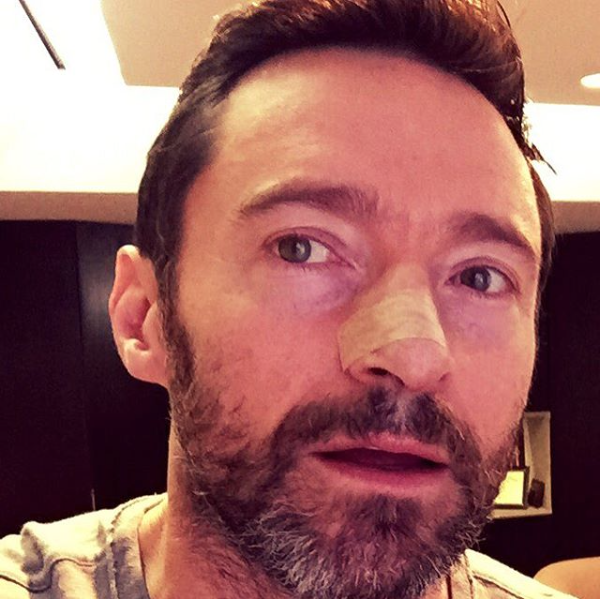Hugh Jackman’s Warning to Fans After Skin Cancer Returns

Hugh Jackman after having his fourth basal cell carcinoma removed from his nose. (Photo: Instagram)
X-Men star Hugh Jackman is using his latest experience with skin cancer as a warning to others. Jackman took to Instagram on Monday to display his bandaged nose with the message: “An example of what happens when you don’t use sunscreen. Basal cell. The mildest form of cancer. PLEASE WEAR SUNSCREEN and get check ups regularly!”
This is the actor’s fourth time having a basal cell carcinoma removed from his nose in the past three years (he’s also had it on his shoulder). He attributes his developing the cancer to not protecting himself with sunscreen when he was a child. “Being an Australian, it’s a very common thing,” Jackman told People magazine. “I never wore sunscreen growing up so I was a prime candidate for it.” In addition to avoiding sunscreen, it turns out that growing up in Australia actually also increased his risk. “The two countries that have the highest rates of skin cancer are Australia and South Africa,” explains dermatologist Ava Shamban.
Basal cell carcinoma is the most common type of skin cancer and affects sun-exposed areas. “Both long-term sun exposure over your lifetime and/or extended intense exposure leading to sunburn can cause damage that can lead to BCC,” explains Manhattan-based dermatologist Sejal Shah. While it’s usually not life-threatening, if not treated the skin cancers can wreak havoc on the skin. “If found on the nose it can spread up and down the nose and be quite disfiguring,” says Shamban. “If it grows on the eyelid it can actually extend all the way into the orbit of the eye.”
The fact that Jackman had a recurrence of BCC is very common because of his past history with that type of cancer. “Your risk of developing additional ones is higher than someone who has never had one,” explains Shah. Jackman has stated that he goes in for checkups with his dermatologist every three months. If you have BCC the most important way to protect your skin in the future, in addition to regular screenings, is to avoid the sun. “Full sun protection including sunscreen, shade hats, and parasols is the best way to prevent this type of skin cancer,” says Shamban. However, there are other cutting-edge treatments that can help patients with sun damage. “In many of my patients, I discuss treatments that can help reverse some of damage and help reduce some of the risk, such as photodynamic therapy, topical therapies like Imiquimod and laser treatments, but they are not FDA approved for BCC prevention. They can treat precancerous lesions (and some cancers), and can reverse some photo damage, so theoretically they can reduce risk, but you still can’t forego regular skin checks,” warns Shah.
Despite the stress of skin cancer, Jackman has used his experience to try to inspire others to protect themselves and wear sunscreen. The star has even launched a line of sunscreen for kids, Pure Sun Defense, to prove that it pays to protect your skin from a young age.
Related:
